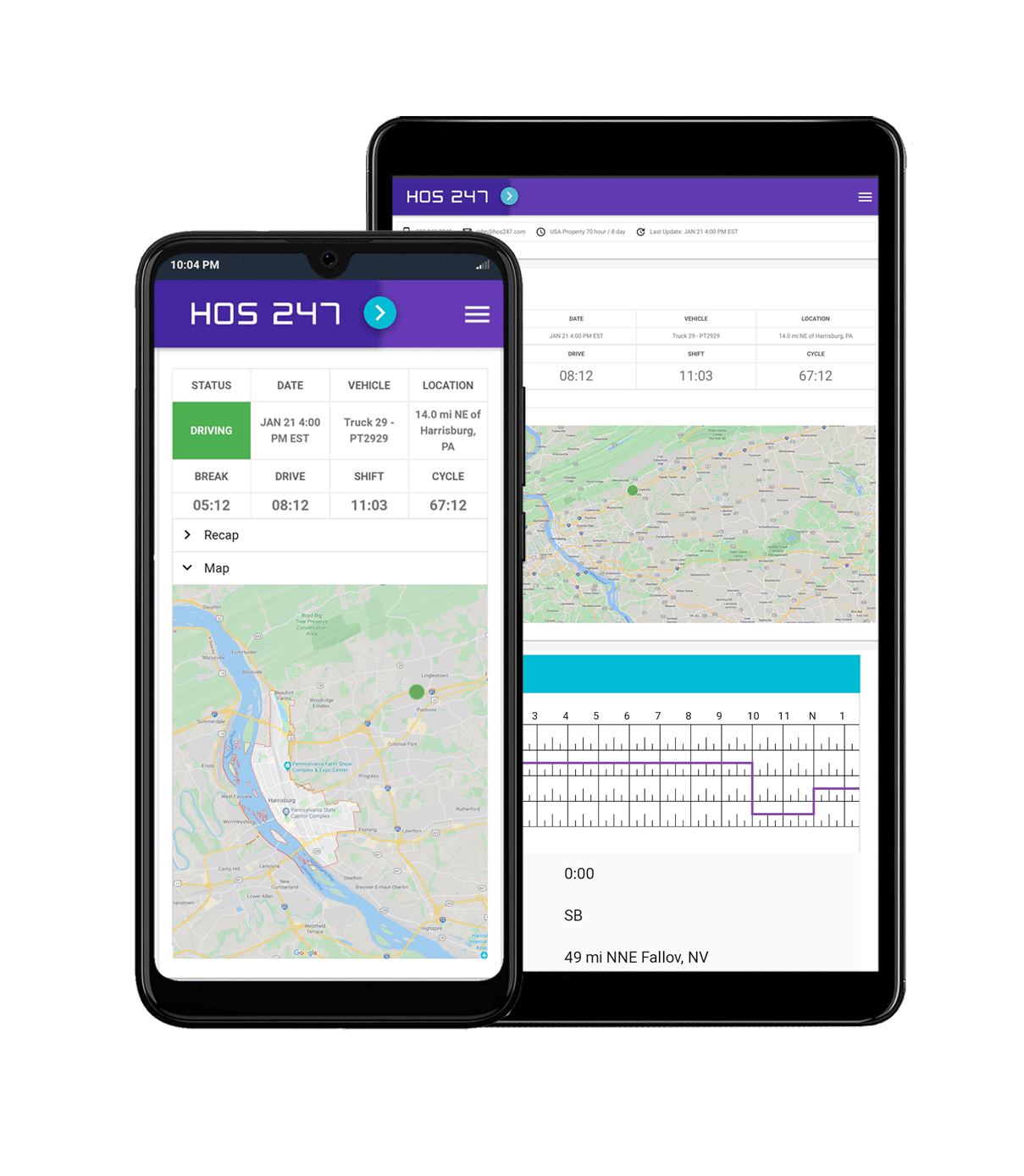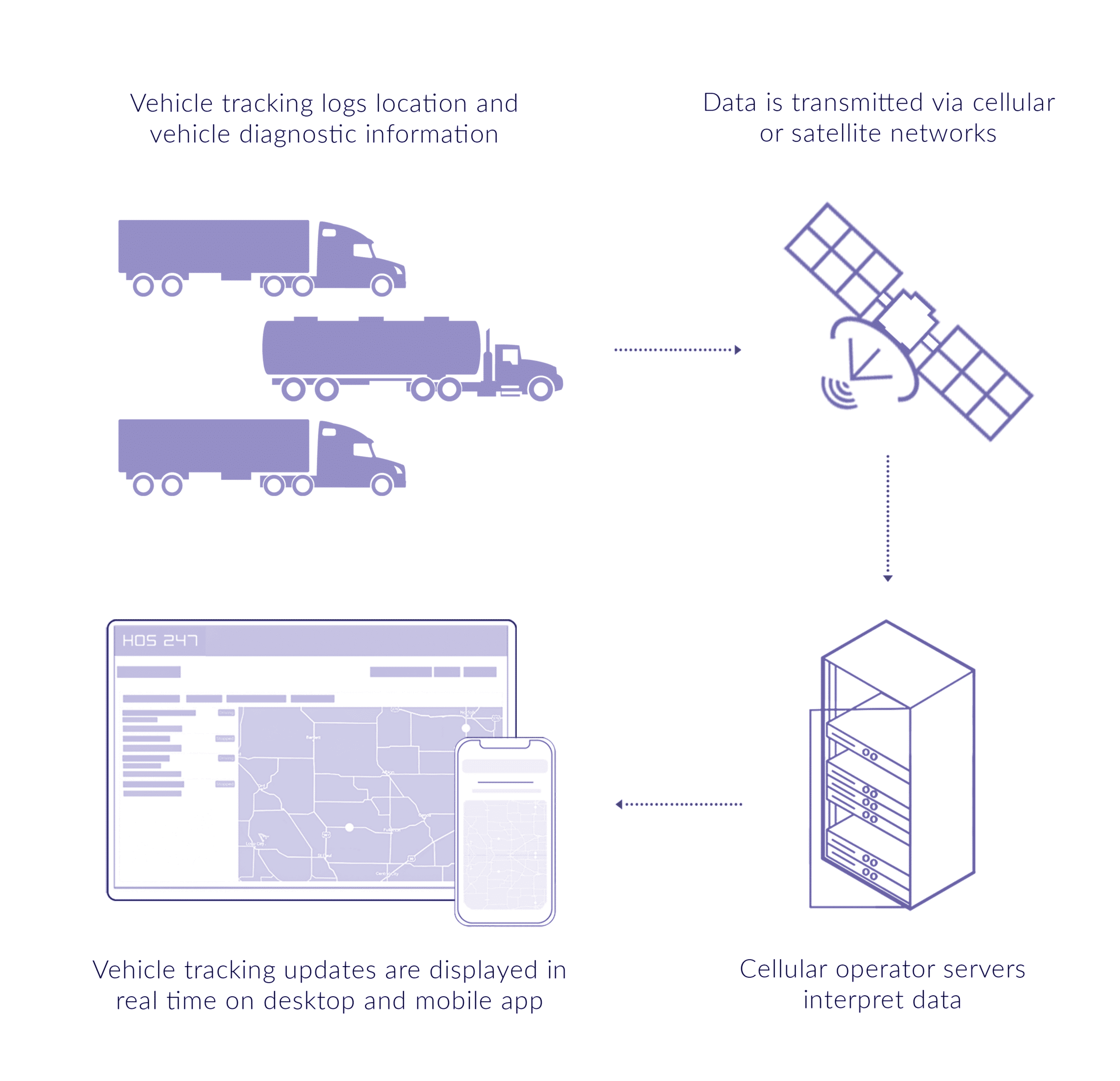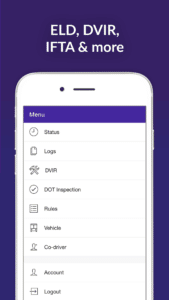Running a business is challenging, no matter the size. Just like giant companies with hundreds of vehicles in operation, owners of small fleets face similar problems related to inefficient dispatch, lack of visibility, extra fuel expenses, and time-consuming paperwork.
Small fleet GPS tracking can give smaller carriers in Canada an advantage by helping them cut operational costs and optimize their workflow, ultimately increasing profitability. In this article, we will discuss the benefits of GPS for small fleets and how HOS247 can help.
Advantages of Using Small Fleet GPS Tracking
Small fleet GPS tracking systems offer numerous benefits to fleet carriers and managers. Besides providing accurate vehicle tracking, a reliable GPS tracker helps reduce road accidents, save on fuel consumption, prevent delays in deliveries, track and recover lost vehicles, lessen maintenance and insurance costs, and gain overall control over operations. Let’s examine the main advantages of small fleet GPS tracking.
Get Full Fleet Visibility by Tracking Your Vehicles in a Real-Time
GPS fleet tracking uses telematics to accurately track vehicle location and send this data to fleet managers in real-time, improving dispatch operations and communication between drivers and the office. Fleet managers no longer need to make regular phone calls to check in with drivers as they will have real-time visibility of their locations.

Ensure Your Fleet Security with Hidden GPS Trackers
GPS trackers can be concealed and send real-time alerts to the fleet manager portal if the vehicle is taken to an unauthorized location or gets into an accident. These devices will track the vehicle even if it is turned off helping recover assets in case of theft.
Cut Fuel Expenses
GPS trackers identify drivers’ behavior, such as idling, excessive acceleration, and hard braking, and notify fleet managers via the web-based portal. This information allows supervisors to take action and improve drivers habits on the road, cutting fuel expenses and reducing the company’s carbon footprint. Maintenance reminders provided by the system based on distance driven also contribute to more efficient fuel use by keeping vehicle’s in top shape.
How HOS247 4G Trackers Will Benefit Your Business
HOS247 is a reliable solution provider with years of experience. Our trackers are dependable, don’t require special installation and can be set up within 10 minutes with the help of our practical manual and efficient technical support.
The HOS247 small fleet GPS tracking helps cut down on operational costs related to increased usage of fuel and vehicle repairs. Real-time tracking allows dispatchers to manage trucks more efficiently, choosing the fastest routes and keeping clients informed about the precise delivery time, which results in improved customer service.

Another perk of our real time GPS tracking for small fleets is enhanced security of the fleet. Here is a quick look at our system’s features.
- Vehicle maintenance. Tracking vehicle maintenance schedules on paper can be a challenge. HOS247 trucking software for small fleets eliminates this issue by monitoring vehicles and notifying managers and drivers about upcoming:
- License renewals.
- Warranty expirations.
- Tire rotations.
- Oil changes.
- Maintenance routines.
- Fault code detection. When the diagnostics system of a vehicle notices a malfunction, it generates a trouble code, alerting drivers through an indicator or warning light and fleet managers through the online portal. These codes are also known as diagnostic trouble codes, and they allow fleet managers to take appropriate and timely action to have the vehicle running properly.
- Automated idle tracking. Idle tracking can make a massive difference in reducing fuel wastage. Fleet managers can determine if their operators are prone to unfavorable driving behavior. This data will allow supervisors to use their fuel efficiently, making sure trucks are not idle and do not over speed. Small fleet GPS tracking software helps determine how much time drivers spend idling, allowing managers to take action.

Truckers need various tools to comply with road regulations, ensure vehicle security, reduce paperwork and optimize their processes. At HOS247, we are familiar with all these needs, which is why we offer an all-in-one small fleet management solution with integrated ELD and IFTA reporting that will considerably improve the efficiency of your fleet:
- Electronic logbook. HOS247 offers its electronic logging device solution to provide trucking companies a reliable way to comply with the ELD mandate. RODS management is straightforward and the interface is user-friendly to facilitate proper use.
- IFTA calculations. With this feature companies can automate their IFTA fuel tax reporting process. HOS247’s system calculates the distance traveled by jurisdiction to eliminate possible errors in manual calculations and save time.
Although GPS trackers are not required by law, these devices facilitate truckers’ work routines, boosting operational efficiency and overall productivity of drivers, supervisors, and dispatchers. On the other hand, starting from January 1, 2023, the Canadian ELD mandate obliges motor carriers to install an electronic logbook in their trucks to record hours of service accurately. Let’s talk more about this legislation and how it applies to your small fleet.
Small Fleets and the Canadian ELD Mandate
The Canadian government decided to implement the ELD law to facilitate the tracking and managing of records of duty status to promote a healthier work environment for drivers and increase road security. The ELD technical standard in Canada requires operators of commercial vehicles to record their driving hours with an electronic logging device instead of manually in paper logs.
The law finally came into effect January 1, 2023, and affects commercial vehicle drivers conducting interprovincial operations, unless they meet any of the following exemptions:
- The vehicle is operated by a carrier who has been issued an exemption by the authorities.
- The vehicle has been rented for 30 days or less.
- The vehicle was manufactured before 2000.
- The vehicle is operated within 160 km of their home terminal, since the driver is nor required to keep a log.
Although the mandate is a federal regulation that must apply to all territories in Canada, carriers that operate inside their province are subject to local jurisdiction.
HOS247 offers carefully developed trucking software for small fleets, making sure they can maintain compliance and avail the various benefits these systems offer.
Benefits of ELDs for Small Fleets
ELDs offer multiple benefits when utilized the right way. These devices can reduce operational costs, streamline operations and significantly increase productivity. Here is a look at some ways ELDs can help your business.
Reduced administrative burden. Electronic logging devices automatically record drivers’ hours of service by collecting data directly from the engine. Automated processes facilitate operators’ routines and also the work of road officials, as the collected data can be easily transferred to inspectors. ELDs keep track of past records, violations, and driver vehicle inspection reports.

Lower insurance premiums. Electronic logbooks will notify drivers of possible violations to improve compliance and reduce the chances of fines and penalties. Clients will have a better perception of your business, and improved compliance translates into lower insurance premiums.
Higher productivity. Electronic logging devices help fleet managers have better control of operations and they let dispatchers know driver’s remaining driving hours as well as their location to assign loads more efficiently.

I’ve co-founded, built and managed several transportation-related businesses. Now, I’m a founder and CEO of HOS247 – an AI Transportation Platform for trucking companies, freight brokers and other logistics operations. We are transitioning old-style operations to technology-advanced logistics entities and help them to grow their businesses. ELDs (electronic logging devices), fleet tracking and management 2.0 combined with AI-powered dispatch tools.












GPS tracking is an indispensable tool for fleet businesses as it provides managers with information about the real-time location of vehicles and other assets, helping motor carriers effectively monitor their fleets and optimize processes. Canadian truck fleet tracking uses Global

With full enforcement of the ELD mandate approaching, it is important to learn how to choose the right electronic logbook. Carriers should look for the specific features that will best serve their operations. Also, looking for an elog company that

Electronic logging devices (ELDs) have revolutionized the trucking industry, providing a more accurate, efficient, and secure way for truckers to record their hours of service (HOS) and ensure compliance with federal regulations. Transport Canada mandates the use of ELDs for